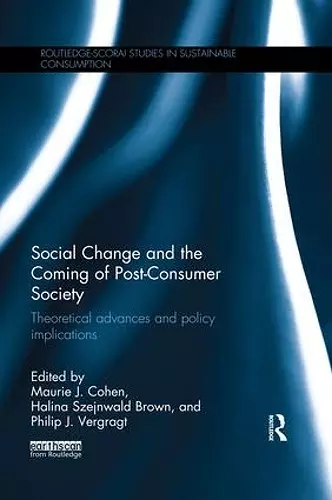Social Change and the Coming of Post-consumer Society
Theoretical Advances and Policy Implications
Halina Szejnwald Brown editor Philip Vergragt editor Maurie Cohen editor
Format:Paperback
Publisher:Taylor & Francis Ltd
Published:8th Jan '19
Currently unavailable, and unfortunately no date known when it will be back
This paperback is available in another edition too:
- Hardback£145.00(9781138642058)

Consumer society is an unquestionably complex social construct. However, after decades of unremitting dominance there are signs emerging that it is starting to falter, both as a coherent and durable system of social organization and as a strategy for societal advancement. Debates concerning how we can transition beyond present energy- and materials-intensive consumer society are beginning to gain greater salience.
Social Change and the Coming of Post-Consumer Societyaims to develop more complete appreciation of the relevant processes of social change and to identify effective interventions that could enable a transition to supersede consumer society. Bringing together leading interdisciplinary experts on social change, the book identifies and analyzes several ongoing small- and modest-scale social experiments. Possibilities for macro-scale change from the interlinked perspectives of culture, economics, finance, and governance are then explored. These contributions expose the systemic problems that are emblematic of the current condition of consumer society, specifically the unsustainability of prevailing consumption practices and lifestyles and the persistence of inequalities. These observations are summarized and extended in the final chapter of the book.
This volume will be of great interest to students and scholars of sustainable consumption, sustainability transitions, environmental sociology, and sustainable development.
"Climate change, water shortages, and toxins in our food, air, and water. Loneliness and depression. Erosion of traditional values. These are among the problems that experts tell us we must solve for humanity to thrive, or even survive. However, these threats are symptoms of a deeper pathology, namely the desire for endless growth in consumption and the substitution of material goods for human relationships. This book sets out theory to understand how this came to be and what might be done about it, from an explicitly multidisciplinary perspective. The book also provides compelling accounts of exciting experiments in sustainable consumption now underway as people around the world seek to live within the limits of our finite planet, and in so doing, restore and heal our environment, our institutions, our communities, and ourselves."– John D. Sterman, Jay W. Forrester Professor of Management and Director of the System Dynamics Group, Sloan School of Management, Massachusetts Institute of Technology, USA
"This fine collection focuses on the relationship between consumption and satisfaction, demonstrating how the economic culture of consumerism causes ecological damage, wasteful use of resources, and mindless yearning for distinction that is mistaken as the utter enjoyment of "freedom." The book explores examples and strategies of "interstitial" change unfolding in the niches of consumer societies, the pursuit of which is driven by both economic crises affecting households and radical ideas of socioeconomic change as well as change of lifestyles. With a balanced focus on both novel practices of consumption and the policies needed to facilitate and nurture them, this volume maps roads toward post-consumerism."– Claus Offe, Professor Emeritus of Political Sociology, Hertie School of Governance, Germany
"If we want a sustainable and healthy environment, it is essential to shift decisively from a hyper-consumerist society. However, we live in a capitalist economy and stable capitalism depends on consumerism. What is to be done in the face of such a sharp contradiction? Social Change and the Coming of Post-consumer Society explores a wide range of approaches to this question. This book marks an important contribution to this area of inquiry. " – Erik Olin Wright, Professor of Sociology, University of Wisconsin and former President of the American Sociological Association, USA
"How do we transform political and economic structures in order to allow everyone to live meaningful lives with less intensive forms of consumption? Where do we start, and who will do the job? These are defining questions during an era of secular stagnation and impending climate disaster, and this book provides an important contribution in the quest for viable solutions." – Giorgos Kallis, ICREA Professor, ICTA-Autonomous University of Barcelona, Spain
"Based on multiple case studies and theories of change, this book argues that the foundational pillars of consumer society are faltering. Drawing on a shared set of theories—from transition management to Karl Polanyi’s embeddedness theorems—the volume contends that without deep changes in macroeconomic and political orientations, and mechanisms that escape current lock-ins, it will not be possible to achieve broad sociocultural change. The message is not of certainty or desperation, but rather of hope. By appealing to deeper values, broad change is possible. A must read for activists as much as for sustainability and consumption researchers." – Joachim Spangenberg, Vice-Chair, Sustainable Europe Research Institute, Germany
ISBN: 9780367030216
Dimensions: unknown
Weight: 460g
234 pages